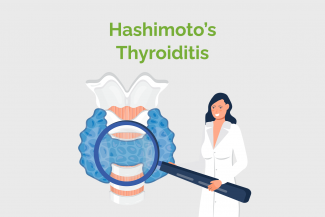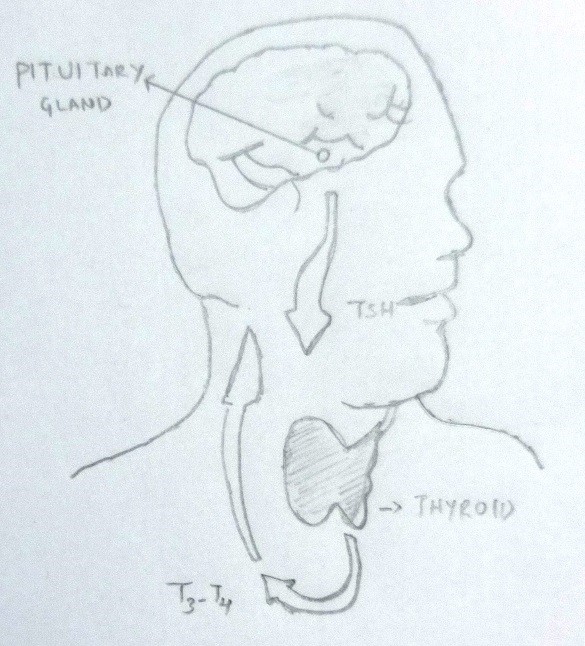
Hashimoto’s thyroiditis, also called Hashimoto’s disease, is an autoimmune disease in which the thyroid is attacked by the body’s immune system, causing symptoms of hypothyroidism (underactive thyroid gland). It is most common among middle-aged women.
What is the thyroid gland?
The thyroid is a 2-inch-long, butterfly-shaped gland weighing less than 1 ounce. Located in the front of the neck below the larynx, or voice box, it has two lobes, one on either side of the windpipe.
The thyroid makes two thyroid hormones, triiodothyronine (T3) and thyroxine (T4). T3 is the active hormone and is made from T4. Thyroid hormones affect metabolism, brain development, breathing, heart and nervous system functions, body temperature, muscle strength, skin dryness, menstrual cycles, weight, and cholesterol levels.
Thyroid-stimulating hormone (TSH), which is made by the pituitary gland in the brain, regulates thyroid hormone production. When thyroid hormone levels in the blood are low, the pituitary releases more TSH. When thyroid hormone levels are high, the pituitary decreases TSH production.
What happens in Hashimoto’s disease?
Our immune system is usually very good at keeping us healthy. When it recognises foreign objects, such as bacteria or viruses, it sends an army of antibodies (protein produced by cells) to attack those foreign objects. But sometimes the immune system goes into attack mode against something that is not a foreign object, like the thyroid gland.
In patients who are suffering from Hashimoto’s thyroiditis, antibodies react against proteins in the thyroid gland and go into attack mode, gradually killing thyroid cells. In the early stages of Hashimoto’s thyroiditis, patients may experience few to no symptoms. But as thyroid cells are damaged during each autoimmune attack, those cells release their stored thyroid hormones. This causes the patient’s thyroid hormone levels to be temporarily high, resulting in symptoms of hyperthyroidism such as panic attacks, anxiety, a fast heartbeat, sweating, shaking hands, diarrhoea, and quick weight loss. This is also known as Hashitoxicosis.
With each attack, more and more thyroid cells are killed, until the thyroid becomes unable to produce enough thyroid hormones, and the patient begins to experience symptoms of hypothyroidism, such as fatigue (a state of physical and/or mental weakness), weight gain, hair loss, constipation, brain fog, memory loss, and more. Once a significant number of thyroid cells are destroyed, the patient becomes hypothyroid, and will need to be on lifelong medication.
Figure 1:The thyroid makes two thyroid hormones, T3 and T4. TSH, which is made by the pituitary gland in the brain, regulates thyroid hormone production. (Diagram courtesy Dr.G.UPENDRA)
Are you at risk of getting Hashimoto's disease: http://www.patientsengage.com/conditions/hashimotos-thyroiditis/causes-risk-factors
Symptoms: http://www.patientsengage.com/conditions/hashimotos-thyroiditis/signs-symptoms
Complications of Hashimoto's disease: http://www.patientsengage.com/conditions/hashimotos-thyroiditis/types-stages
What tests do you need to have done: http://www.patientsengage.com/conditions/hashimotos-thyroiditis/diagnosis-tests
Treatment of Hashimoto's Thyroiditis: http://www.patientsengage.com/conditions/hashimotos-thyroiditis/treatments
Managing Hashimoto's Thyroiditis: http://www.patientsengage.com/conditions/hashimotos-thyroiditis/management


















